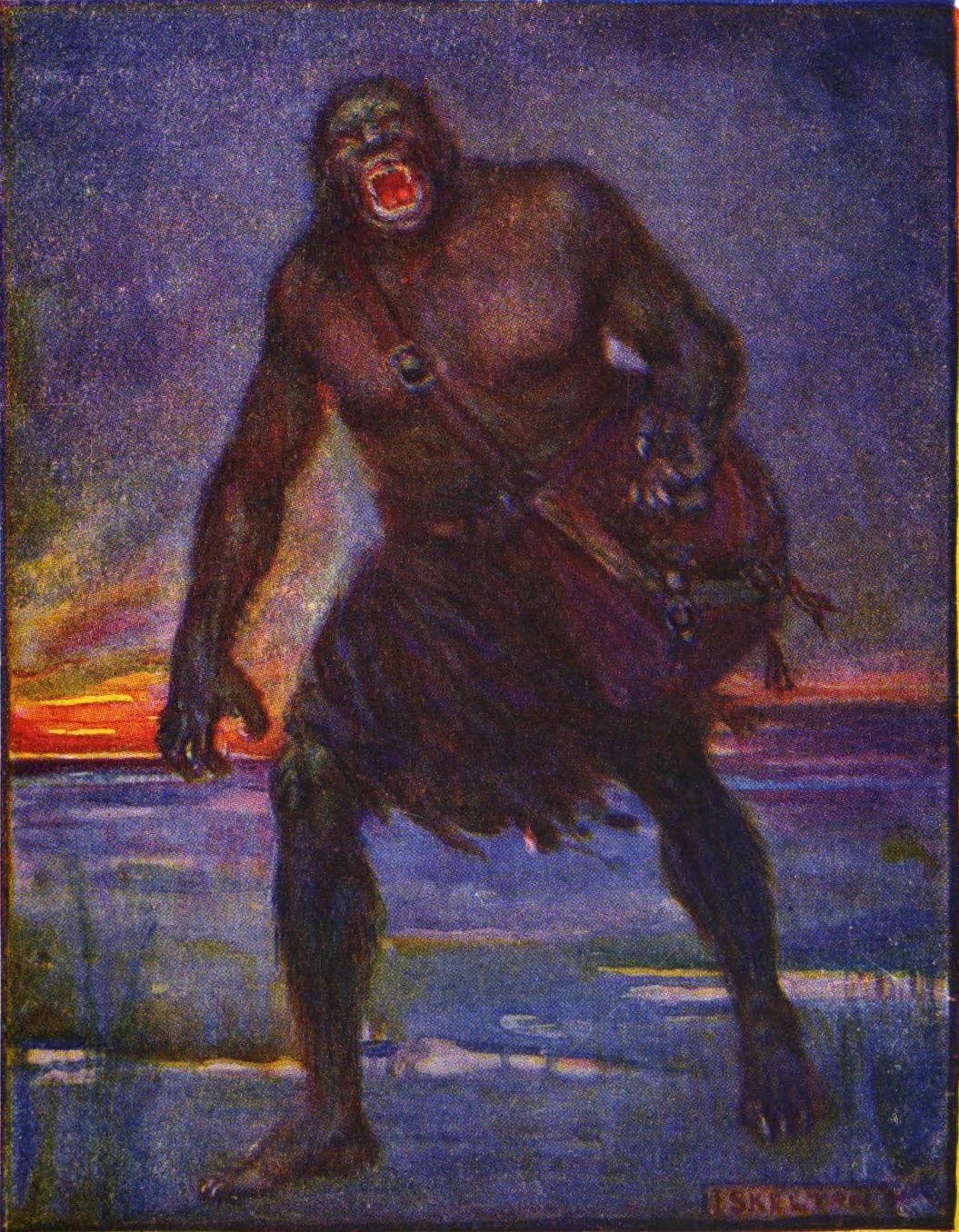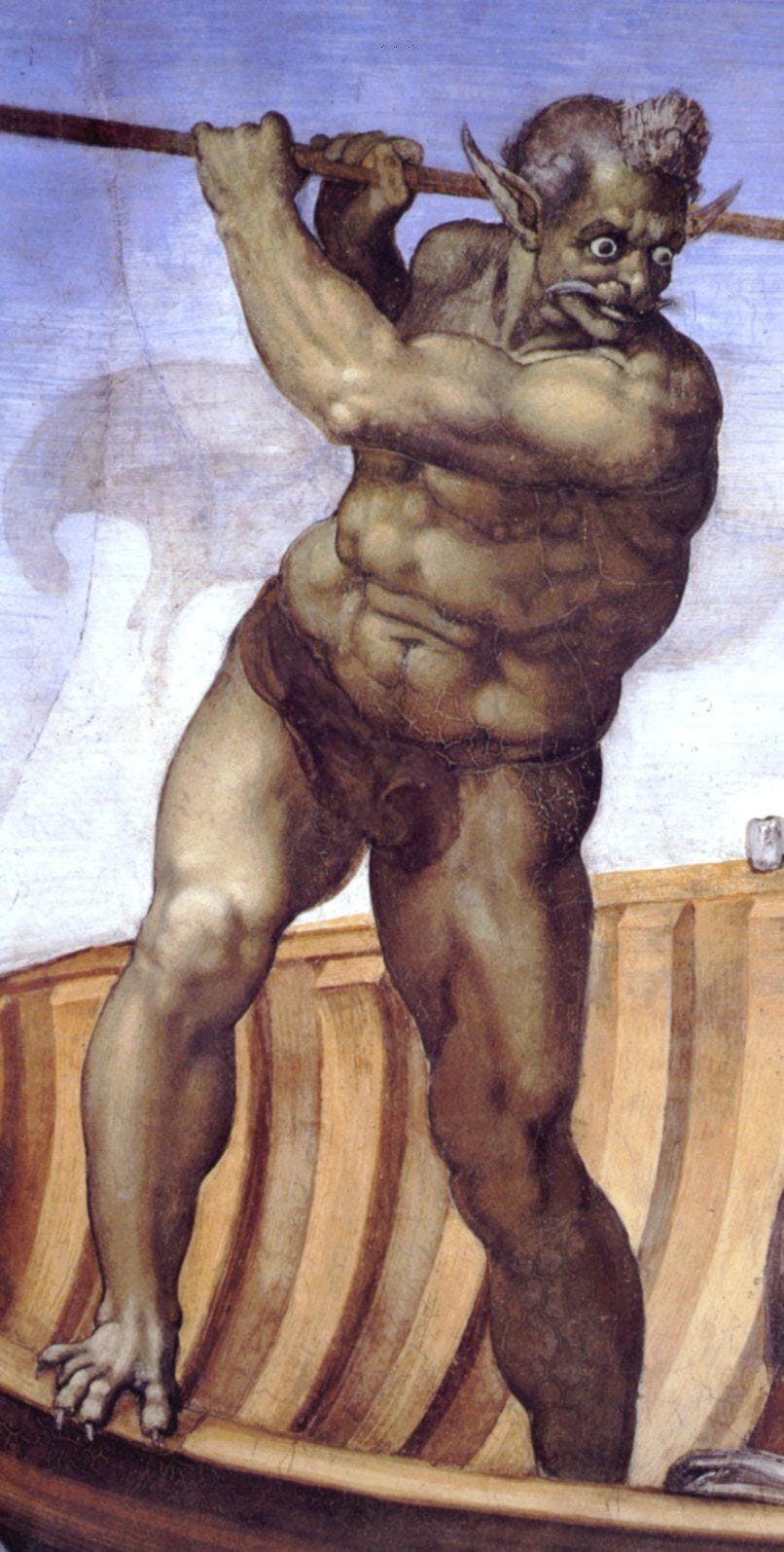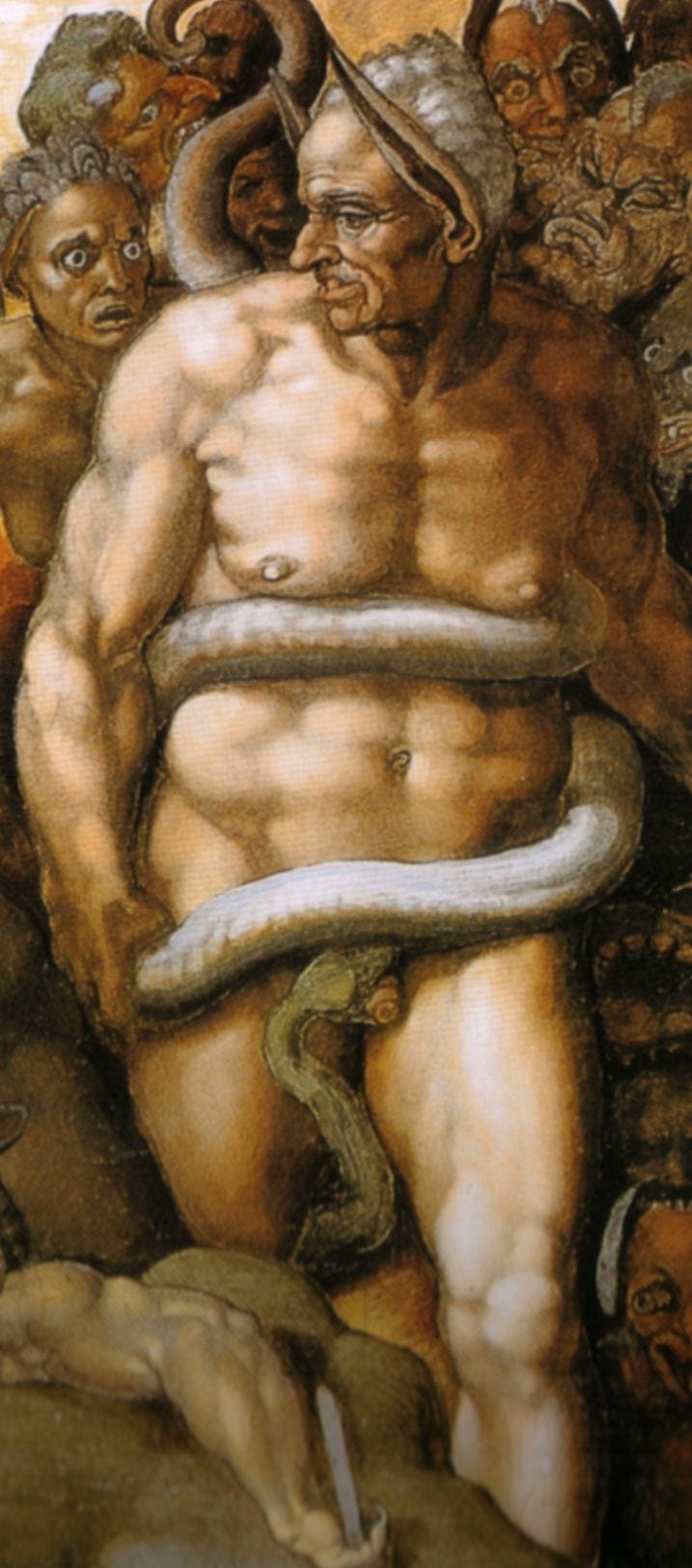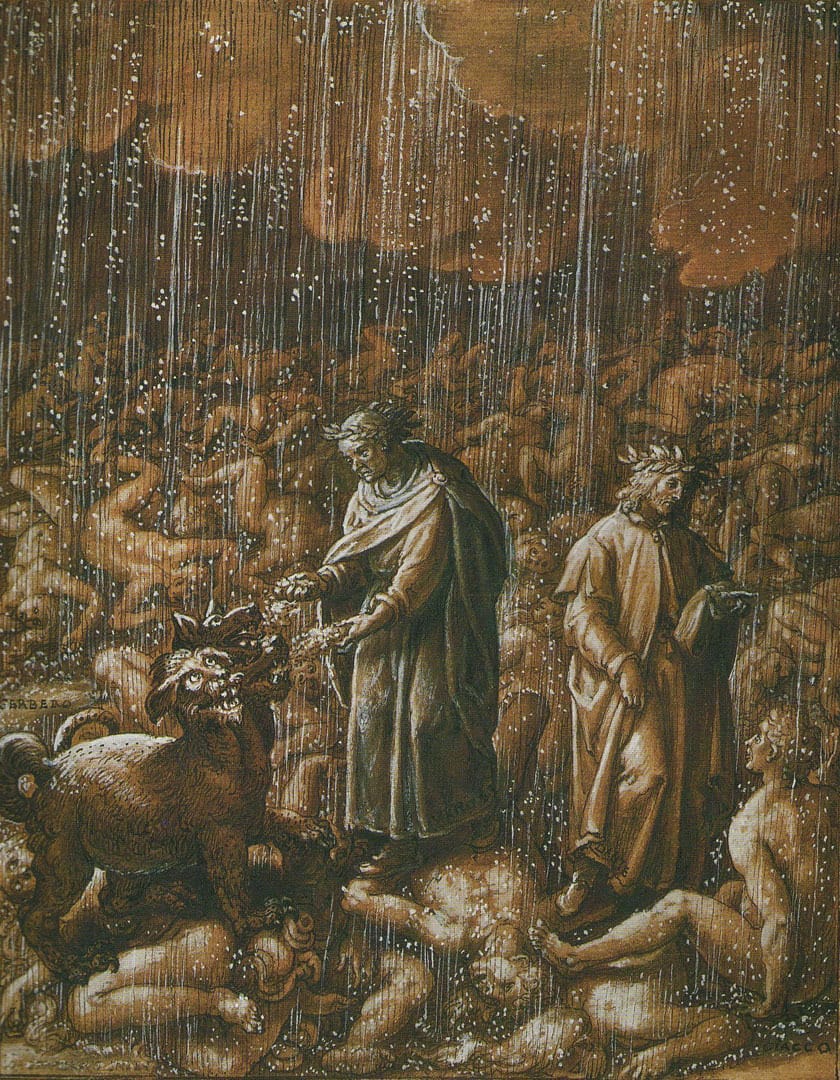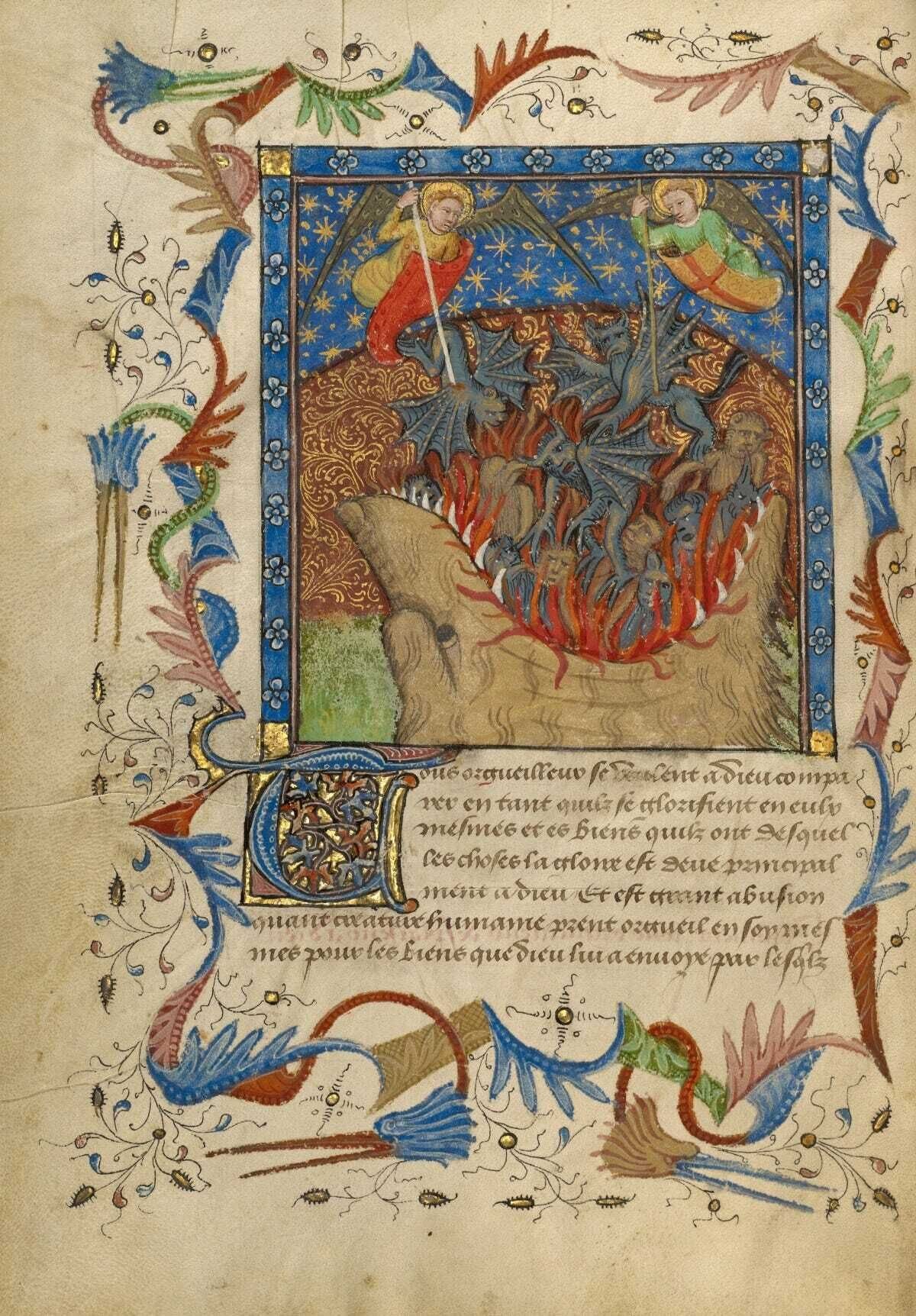The origins of demons, monsters and false gods
At least according to Dante, Milton and the anonymous author of Beowulf
The epic poem Beowulf opens with the story of the long and tragic reign of the King of Denmark: Hrothgar, son of Healfdene, descendant of a glorious dynasty that was almost destroyed—all because of a monster that decided to ambush and eliminate all the warriors of the kingdom, Grendel.
In the first chapter of Beowulf, it is described how Grendel, who lived near the Royal Palace, the seat of King Hrothgar, laid a nightly siege on the palace for 14 long winters, carrying off a warrior or two at a time with his giant paws to his diabolical lair. This lair, when our hero Beowulf finally reaches it, is described as a hell similar but not identical to the hell we know. Immediately after this description, we discover the origin of Grendel: a descendant of none other than Cain, the father of demons, monsters, giants, and other vermin. In Old English, the word is "elf."
❝
He was spawned in that slime,
Conceived by a pair of those monsters born
Of Cain, murderous creatures banished
By God, punished forever for the crime
Of Abel's death. The Almighty drove
Those demons out, and their exile was bitter,
Shut away from men; they split
Into a thousand forms of evil-spirits
And fiends, goblins, monster, giants,
A brood forever opposing the Lord's
Will, and again and again defeated.
Beowulf
An illustration of Grendel by J. R. Skelton from the 1908 Stories of Beowulf
This genealogy, which is not detailed in the work in any depth, is perhaps an example of a Christian addition that came later to the myth. After all, the poem was indeed written in Old English and during the Christian era (perhaps by a monk), but it describes an ancient pagan world that is at least a few centuries older and located in a different geographical area, Scandinavia. It seems that the numerous references to the Christian God in the work—of Beowulf and the other heroes—do not always succeed in convincing even the poet himself of their authenticity. At one interesting point in the poem, the king's advisers, who have failed to advise the king on how to get rid of Grendel, are described as turning to their ancient stone gods in vain. The poet, discouraged by the rooted paganism of the characters he describes, assures us that they will meet their false gods in hell.
The only manuscript of Beowulf dates to the ninth century AD. About three hundred years later, a poet whose name we do know, Dante Alighieri, decided to descend into the same hell. In his 100-chapter journey (canto) through the worlds of the dead, Dante meets many sinners and saints, monsters and angels—but none of them belong to the same Scandinavian space. In Inferno (the Christian underworld), Dante encounters several monsters from Greek and Roman mythology.
What is interesting is that these monsters do not endure the torments of the inferno; perhaps the opposite. They have the dubious pleasure of judging and torturing mortal sinners who are destined for hell.
Dante based his Inferno on the underworld journey on an early pagan hero, Aeneas. The story of the legendary hero's escape from Troy, the many hardships he endured in his travels until he founded the city of Rome (including a descent to the underworld) was written by the Roman poet Virgil, who will be Dante's own companion to Hell and Purgatory. No wonder, therefore, that Dante's Christian hell is based on the Greco-Roman underworld, both in the characters that inhabit it and in the names of the various rivers and other geographical locations. Dante and the European Christian culture in which he was educated, a culture that he represented so perfectly in his Divina Commedia, mostly adopted as a whole the two cultures that preceded it (Ancient Greece and Rome).
I expanded on this much more in my essay on the first circle of hell. Here, I will limit myself to saying that, unlike the last example we will deal with shortly, Dante embraced the Greek monsters but mostly ignored the gods of the Greek pantheon. They have no presence in hell, neither as sufferers nor as causes of suffering. This absence makes Dante's silence about it both mysterious and perplexing.
The first of these mythological characters we meet in the third canto of the Divine Comedy is Charon, the ferryman of the Greek underworld. His role is to carry the souls of the dead, who in Greek mythology are often described as shadows (and also in Dante’s poem), across the two rivers of the underworld that separate the world of the living from the dead. While in Greek mythology Charon's nature remains obscure, Dante refers to him as "Caron Dimonio" (Charon-Demon).
Charon as depicted by Michelangelo in his fresco The Last Judgment in the Sistine Chapel
The demons of hell, perhaps because of their long experience as servants of Hades since pagan times, are endowed, according to Dante, with the ability to immediately examine and judge all the souls of sinners. Charon orders Dante not to board his boat because he is not dead, while at the entrance to the first circle stands a menacing figure named Minos.
❝
here stands Minos, horrible, snarling, examines their offences at the entrance, judges, and despatches them according as he girds himself;
Minos is the judge standing at the entrance to hell (the first circle is considered separate, where sinners do not suffer physical torture—only distance from God). He listens to the confessions of each soul and decides to which circle to send it. However, this judgment is bureaucratic in nature, as final justice always rests with God. Minos makes his sentence clear with his monstrous tail.
In Greek mythology, Minos was a man of flesh and blood, an important king who was described as particularly wise but also cruel and full of pride, but, and it’s important for us, he was not depicted as a monstrous figure. While he was appointed to be the judge in Hades after his death, in Dante's work, Minos becomes a much more threatening figure.
The last creature from the Inferno I'll discuss here (but not the last in the Inferno itself) is Cerberus, the multi-headed dog (usually sporting three heads, but sometimes more) known in Greek mythology as the hound of Hades. He is the true guardian of the entrance to the Underworld—not so much to keep the living from going inside, but to prevent the dead from escaping. Cerberus is a monster so fierce that capturing him became the last of Heracles' twelve labors.
Because there is no longer a need to guard against the dead escaping the Inferno (Dante needed divine help just to enter), Cerberus' new role in the Commedia is to torture those condemned for the sin of gluttony in the third circle of hell. This is probably an echo of Virgil's own epic poem, in which Cerberus is depicted as the devourer of dead flesh with a rabid hunger (fame rabida). Not only that, in sharp contrast to earlier mythological depictions of Cerberus, in Dante's poem he is turned into a half-dog, half-man with a greasy black beard and a huge belly. The sinners in the third circle, on the other hand, cry out what sounds like angry barks against the pouring rain that turns the terrain into a stinky swamp.
In Canto VI of the Commedia, Virgil feeds him earth (terra in the original Italian).
Amid the pouring rain, Dante and Virgil encounter Cerberus, as illustrated by 16th century painter Stradanus
Fast forward about 350 years, and we encounter other demons in the same Christian hell, and this—personally— is my favorite vision: John Milton's portrayal in great detail in the second book of Paradise Lost.
Satan, who has already declared revenge on God in the first book, holds a council to determine the nature of his revenge. I refer you to the sentence he spoke in the previous book. It is clear that there will be an ongoing war with God; the only question is what kind.
❝
Warr then, Warr
Open or understood must be resolv'd
John Milton, Paradise Lost, Book I
At the beginning of the second book of Paradise Lost, Satan presents his rebel angels with the problem and then asks for their advice. Although he is described as an Oriental king, he tries to show that he favors discussion—that he is a parliamentary-style governor—contrasting his actions with God's tyrannical rule. Four fallen angels present their advice to the Council of Angels. The first angel to speak is Moloch, who calls for open war. What is interesting about this initial war cry, so bold at first, is that it soon becomes less confident as the angel speaks.
Moloch essentially asks, Do we really have a chance? And if we don’t, if we lose again, what will God do to us that could be worse? The assumption is that the angels—even the most sinful—are beings of a different order. They cannot be completely destroyed. Therefore, the punishment will be infinite, but it does not involve their destruction. That’s why Moloch advocates for fighting, asserting that even if we fail, it will still be a realization of our revenge.
The Fall of the Rebel Angels in Livre de Bonnes Meurs, about 1430, French. Getty Museum
Belial speaks second. He offers the opposite advice: to not fight, to do nothing at all. Because the punishment may be worse than what we have already experienced. God might destroy us (it turns out there is such a possibility), or, if He cannot do so, He might arrange a worse punishment than the one we received when we fell here. What if we couldn't break free from the chains as we did in the previous book? What if we were forever doomed to burn in the river of fire?
A third voice comes from Mammon, whose advice is the most pragmatic. He suggests abandoning the war/non-war debate in favor of a completely different approach: building hell. “We have hard liberty,” he says, “the freedom to build this world ourselves and make it worthy.” While we may not be able to create a heaven for ourselves, we can make hell a livable place. This advice is met with genuine applause, as it seems that most of the angels favor it. However, a red flag immediately goes up for those who are familiar with the epics on which Milton draws: We are transported to the second book of the Iliad, where Agamemnon attempts to test the Greek warriors' fighting spirit. The king of kings of Greece proposes to offer them the opportunity to return home, as they have been engaged in continuous fighting for nine years. Zeus has led him to believe that this would replenish their remaining energy and help them defeat the Trojans. But the Greek warriors cheer for the chance to go home.
Unlike Agamemnon, Mammon did not resort to trickery but genuinely offered this logical approach. This won’t help.
The fourth and final speaker is Beelzebub, Satan's right-hand man, and his advice is accepted. Beelzebub advocates for rebellion, and here we encounter Satan’s own argument: after their defeat in the heavenly battle, Satan has come to understand that God cannot be defeated. God is omnipotent, and the previous battle demonstrated this. However, a new world has been created—Earth—and with it, new creatures: humans. Therefore, the war must be waged there. It will be a hidden war, a war of seduction and rejection of the good, a struggle for the middle ground between heaven and the abyss of hell.
If the names of the various angels sound familiar, it is because Milton is playing an intriguing and bold game (boldness isn’t something this poet lack—just read the opening of the first book to see that). Milton takes names of gods mentioned in the Hebrew Bible and transforms them into something completely different: the angels who trusted the devil and fell with him. What I see Milton doing is making "Darkness visible"—to borrow a great phrase from his epic poem.
Here, Milton presents something fascinating that in a way we already encountered in Beowulf: the pagan gods are not false gods in the sense that they do not exist. No, they do exist and operate in the world, and they do so with full awareness that they are seducing humanity away from the straight path, which is the path of the true God.
Although the devil is ultimately doomed to failure, he did achieve a significant success, didn't he? After the fall—after eating the forbidden fruit and the expulsion from the Garden of Eden—the world becomes a realm of lies and temptation, governed entirely by sinful angels who oppose God. It is only after Jesus returns that we will receive the true gospel. Even then, has humanity really changed? Are the demons and angels gone? As Beowulf and Dante make clear—absolutely not.
A final thought: what do we read into the scriptures:
How should we understand the existence of other gods, monsters, and demons in the world of the one and only God? First of all, we should not be surprised, as the Hebrew Bible—the foundation of the three monotheistic religions—did not deny their existence.
One vivid memory from my school days is the Bible lesson where we learned about the battle between Moses and the magicians of Egypt. Moses managed to turn his staff into a giant snake, but the other magicians were also successful in turning their staffs into snakes. They too held magical powers—lesser, but still significant.
It is important to remember that what we tell ourselves about the biblical text and what is actually described in it are often completely different. A central example is the clear hints of the existence of a divine body. It’s not just that we were created in the image and likeness of God (Genesis 1:26), but also when Moses ascends Mount Sinai, God tells him that he will only be able to see His back, because "no man shall see Me and live" (Exodus 33:20).
It was only with the introduction of Aristotelian philosophy into Jewish, Christian, and Islamic thought during the Middle Ages that the conception of God shifted to an abstract figure that we cannot describe in any tangible way.
So how can one explain the disappearance of the old gods from the Greco-Roman world and later from the Scandinavian region? Maimonides, the 12th century Jewish philosopher who contributed significantly to the idea that God has no physical body, believed that by the time of the Talmud, the Jewish inclination towards the worship of other gods had already diminished. Of course, this is a simplistic description of historical reality, which is always more complex than any of our explanations.
What is more intriguing to me is the new interpretation Rambam offered for the sin idolatry. He believed that the foreign worship of his time was rooted in the tangible perception of God in the minds of the simple believers, and that this misconception needed to be uprooted. If he were a Medieval Christian rather than a Jewish philosopher, he might have blamed the devil for this.




